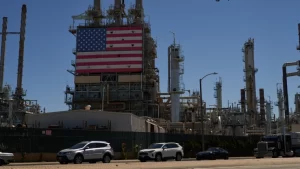
By Guillaume Toulza, Student at McGill University
In their Q3 earnings reports, US supermajors Exxon (XOM) and Chevron (CVX) disclosed record profits of $31bn in combined net income, a 243% increase YoY, and their best quarter and second-best quarter respectively, surprising analyst ratings by far. Exxon highlighted strong volume performance and rigorous cost control as key motors of its quarterly results. On a macro level, these results were fuelled by yearly inflated energy prices, as Russia’s invasion of Ukraine triggered a series of policies resulting in limited supply in commodity markets.
The Vanguard Energy Index Fund (VDE) rocketed 65% upwards YTD, setting the oil and gas industry as a top performer in capital markets – with Exxon and Chevron sharing the crown. By contrast, Big Tech suffered significant losses this year with the S&P tech index down 26%, and analysts offer mitigated growth prospects. Meta (META) notably plummeted following poor third-quarter earnings and investor scepticism.
Political Response
US president Joe Biden attacked US oil companies, accusing them of war profiteering and warning that a tax on third-quarter profits would be imposed if the producers fail to lower petrol prices by raising output. Mike Sommers, CEO of the American Petroleum Institute, pointed out that taxes would rather discourage the production and suggested that measures aimed at lowering demand should also be weighted.
The rise of Big Oil puts pressure on Democrats as midterm elections renewed scrutiny on their agenda. The Biden administration recently dug into the US Strategic Petroleum Reserve, calling for a refill order at a floor price as they argue it would incentivise oil companies to increase production. The presidency’s latest move regarding windfall taxes foreshadows a tighter governmental grip on the oil industry.
Meanwhile, the European Council discusses imposing a cap on energy prices in addition to creating a buying cartel. After the bloc’s members initially laid out this motion, work within the European Commission took place in Brussels regarding its implementation but the executive body calls for further debate.
Prospects For Big Oil
Despite the presidency’s urges, executives at Exxon and Chevron said the companies will remain investor driven. In line with Wall Street’s consensus, both supermajors plan to increase dividends to shareholders as a payout on their outstanding profits. On the other hand, UK supermajor Shell announced it would embrace taxes on its high profits, to mitigate the global energy crisis.
As the sector keeps strengthening its policies, investors remain confident in its ability to return substantial profits. Recently, a major cut to oil production was announced by the OPEC cartel in early October and starting as of November. The decision was led by Saudi Arabia amid escalating political tensions over soaring energy prices and high demand: while the US government repeatedly oriented efforts towards dragging prices down, Saudi Arabia asserted its intent to further raise crude prices after OPEC+ members expressed concerns about a price plunge.
Yet, it remains unclear whether Exxon and Chevron will be able to navigate steadily in the future, as rising political and environmental pressures loom over the oil and gas industry. The OPEC secretary-general underlined the mixed message sent by some governments, who expect both a boost in oil output and a shift towards renewable energy sources.
Very interesting information!Perfect just what I was looking for!